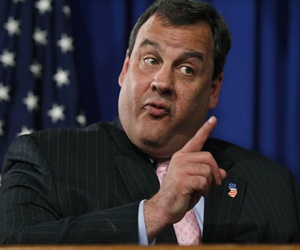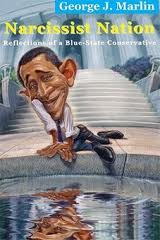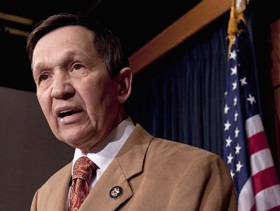From Herman Cain’s mouth has come a message that is now on the lips of many Republicans: “Yes, We Cain!” Having turned in impressive performances in several debates, the former head of Godfather’s Pizza won a surprise victory Saturday in a straw poll of Florida GOP activists. The Sunshine State tally is only a straw poll, but it has predicted the Republican nominee correctly in the past three presidential elections.
So who is Herman Cain?
 |
| Herman Cain, rallying supporters before the Florida Straw Poll Saturday, won the tally handily. Jim Broussard, a Pennsylvania tea party leader, lauds Cain thusly: "He has charisma, charm, and can project a message to people that: ‘Hey, I worked my way up just like your average guy out there.'" (Getty Images Photo) |
The 65-year-old “Hermanator” was head of the National Restaurant Association when he first appeared on the national scene in the 1990s as a fierce critic of Hillary Clinton’s attempted takeover of the healthcare system. His confrontation the first lady and President Bill Clinton set him on a path to a presidential candidacy that now spurs GOP activists to yell “Yes, We Cain!” at his rallies.
Slate.com credits Cain with having “defeated Bill Clinton on live television” and changing the terms of the 1994 healthcare debate.
During a town hall meeting that year in Kansas City, Cain asked President Clinton what he was supposed to tell the workers he would have to lay off because of the cost of the "employer mandate."
Clinton responded that there would be plenty of subsidies for small businesses, but Cain challenged him: "Quite honestly, your calculation is inaccurate. In the competitive marketplace, it simply doesn't work that way."
The exchange led to a flood of supportive phone calls and faxes in that era of the Internet’s infancy. “It was as if the small business community — a very large and politically powerful group — had been told to march on Washington,” Newsweek reported.
Larry Neal, an aide to Texas Sen. Phil Gramm, told Cain he "was the lightning rod” in the revolt against the so-called Hillary Care.
After that auspicious debut, Cain quickly became active in politics. House Speaker Newt Gingrich gave him a spot on a congressional panel studying tax reform. He became president of the Federal Reserve Bank of Kansas City. Jack Kemp made time to visit Cain in Omaha, where he was serving as CEO of Godfather’s Pizza.
Kemp told the Washington Post: "Here's a black guy who stands up with the voice of Othello, the looks of a football player, the English of Oxfordian quality and the courage of a lion."
After leaving Godfather’s, Cain plunged into politics full time. He co-chaired Steve Forbes’ 2000 presidential campaign, made a respectable showing in a 2004 U.S. Senate race in Georgia, and parlayed that showing into a gig as a popular Atlanta talk show host.
This year, he became the first person to launch a presidential campaign and quickly exceeded almost everybody’s expectations but his own.
Cain’s self-confidence stems in part from how far he’s risen from his hardscrabble background. He was raised in Georgia, where his father was a chauffeur and his mother, a domestic worker. He was the first in his family to go to college, after which he served in the U.S. Navy and became a business analyst for Coca-Cola. Cain then moved over to Pillsbury, where he became a turnaround specialist for troubled parts of that company before being installed as CEO of Godfather’s.
On the side, he found time to be a Baptist preacher, a gospel singer, and the loving father of a son and a daughter.
But Cain hungered for more. Surveying an underwhelming Republican field of presidential contenders early this year, he saw he had the street cred to appeal to key elements of the conservative base: Southerners, the religious right, small business owners, and the tea party.
Jim Broussard, a Pennsylvania tea party leader, says: "He has charisma, charm, and can project a message to people that: ‘Hey, I worked my way up just like your average guy out there.'"
But his style also has won him plaudits from media heavy hitters. After Cain performed well in the first GOP presidential debate, conservative radio talk-show host Rush Limbaugh opined that "Herman Cain made me think I was listening to me in every answer."
Indeed, Cain credits that first debate with launching his rise in the polls. "Until then, a national audience had never heard me. Now they are starting to hear me, and I don't think they'll forget."
Indeed, he continues to sweep straw polls of activist Republicans. At the Western Conservative Summit in Denver on July 31, Texas Gov. Rick Perry stole the headlines with a speech attacking the “arrogant” Obama administration. But Cain won the straw poll of activists who attended.
Although the odds are stacked against him with the presence of better-known candidates such as Perry, Mitt Romney, and Michele Bachmann in the race, don’t underestimate the “Hermanator.”
There is a precedent for a charming, long-shot candidate to shake up the presidential race. In 2007, former Arkansas Gov. Mike Huckabee parlayed a strong showing in the Iowa Straw Poll that summer into a victory in that state’s caucuses the following January by consolidating the evangelical vote behind him.
But Huckabee had one advantage Cain does not: serious experience in a major political office. Usually articulate, Cain often stumbles when he's asked about foreign policy, falling back on rote responses that he hasn’t “gotten all the briefings a president does” and he would wait to formulate a full foreign policy until he consults with the experts as president.
For now, he offers hints at his direction, including unswerving support for Israel and a belief that “we must identify our friends and our enemies overseas and stick with our friends.”
He also has made a few rookie mistakes. In July, he met with four Muslim leaders in Virginia and issued an apology for remarks in which he said communities have a right to ban Islamic mosques because Muslims are trying to inject Shariah into the United States.
He also had to clarify remarks in which he said he wouldn’t want a Muslim in his administration by saying that he meant only Muslims bent on jihad. In a statement after meeting with the Muslim leaders, Cain said he was "truly sorry" for comments that may have "betrayed" his commitment to the Constitution and the religious freedom it guarantees.
But his missteps don’t matter to the crowds who gather to hear Cain’s inspirational speeches. He likes to open with a joke at President Barack Obama's expense. He'll recite the opening words of the Declaration of Independence from memory, then he'll say he didn't need a teleprompter to do it.
He follows that with a mashup of inspirational, Dale Carnegie-tinged CEO rhetoric ("The tragedy of life does not lie in not reaching your goals. The tragedy lies in having no goals to reach for"), followed by tea party-influenced reverence for the Constitution and the nation’s founding principles.
He openly challenges liberal attacks on the tea party as tinged with racism: “If that were at all true, do you think I’d be spending so much time with you patriots?”
When it comes to specifics, Cain hammers home his “9-9-9” plan: a 9 percent corporate tax rate, a 9 percent flat income tax, and a 9 percent national sales tax.
“Our tax code is the 21st-century version of slavery,” Cain tells audiences.
“If 10 percent is good enough for God in the Bible, then 9 percent should be just fine for the federal government.”
When challenged with the argument that his program seems far too ambitious for a new president to push through Congress, Cain argues right back: “My election would signal a real desire for change by the American people. Those who elected me would put pressure on Congress to enact my program. And we’ve seen that when Congress feels the heat, they will often see the light.”
Herman Cain isn’t likely to become president, but his impressive campaign is making him a major player in the public debate in years to come. He could follow Huckabee and become host of his own TV show. Or he could fit easily into a Republican Cabinet in a position such as Commerce secretary.
Or he simply could continue being the “Hermanator,” a force of nature that has given voice to the tea party and helped make it the most vibrant force on the American political scene.
Yes he can.

 Christie has a “freshness” about him that’s lacking in Mitt Romney, according to the Post. The newspaper touted Christie’s success as a prosecutor in fighting his state’s “endemic corruption,” and pointed to his achievements as governor in bringing “fiscal responsibility” to New Jersey, enacting public pension reform despite an “intransigent Democratic legislature.”
Christie has a “freshness” about him that’s lacking in Mitt Romney, according to the Post. The newspaper touted Christie’s success as a prosecutor in fighting his state’s “endemic corruption,” and pointed to his achievements as governor in bringing “fiscal responsibility” to New Jersey, enacting public pension reform despite an “intransigent Democratic legislature.”





![[Xplore9]](http://si.wsj.net/public/resources/images/OB-PN509_Xplore_G_20110908123815.jpg) Dan Neil/The Wall Street Journal
Dan Neil/The Wall Street Journal 

![[SB10001424053111903285704576558662983827094]](http://s.wsj.net/public/resources/images/OB-PN503_Xplore_D_20110908122855.jpg)

